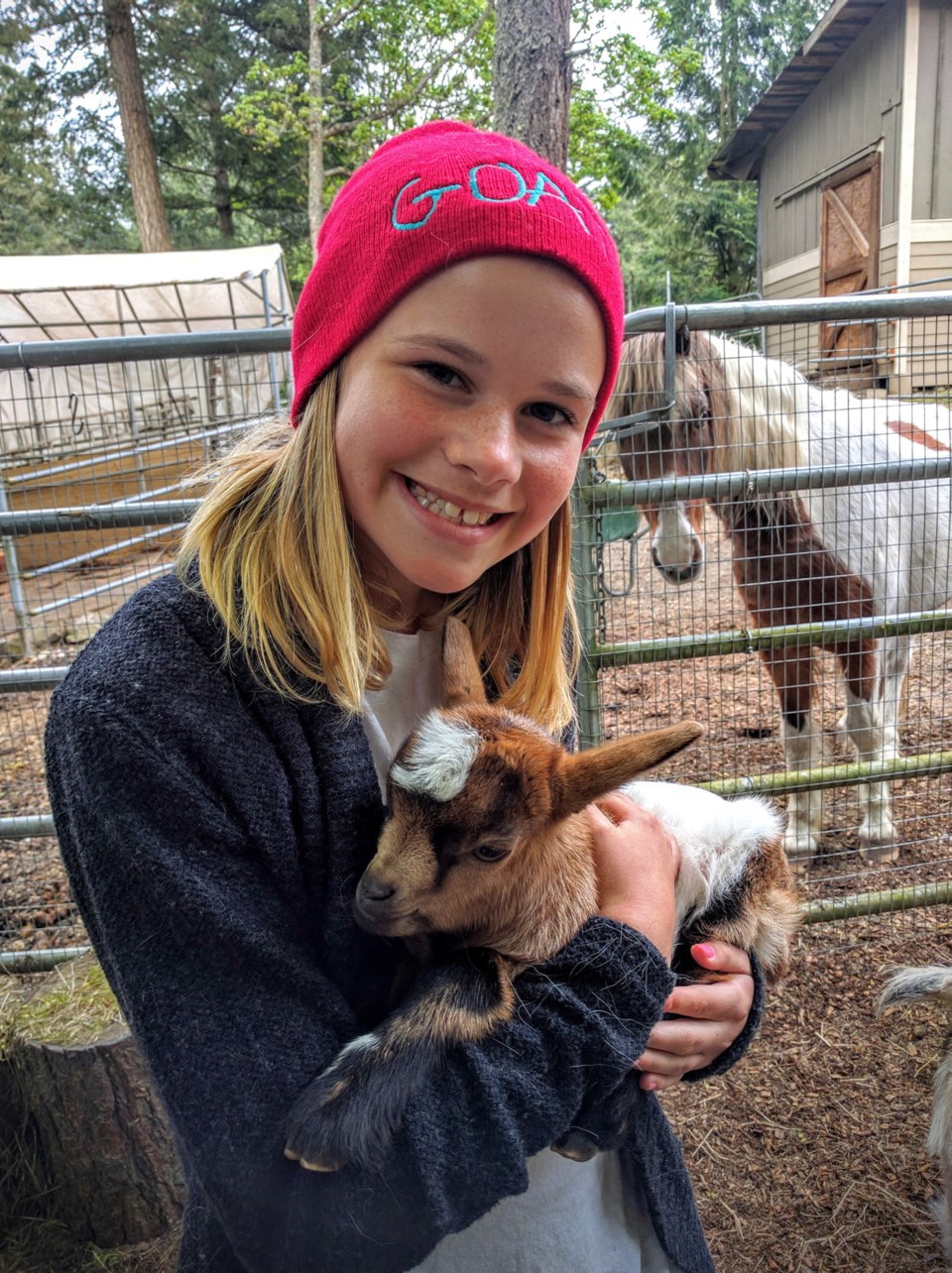Saanich council will chew on a 10-page report from municipal staff Monday before deciding if, when and how miniature goats might end up grazing in residential yards.
No one has more at stake than 12-year-old Jillian McCue, who has been lobbying council and its committees for three years for the legal right to raise her own little ruminant. Her family is willing to fence their Gordon Head yard and provide for a “homier shelter” if council decides to give mini-goats the go-ahead.
Jillian said she hopes councillors vote for the option recommended by staff — combining a pilot project of nine properties with a community study — and not the option that would postpone things for another year.
Nearby residents need not fear pro-goat fervour will stomp on their concerns. Staff recommend “written approval of all neighbours within 100 metres of the subject property,” along with limiting manure piles to three cubic metres, to be stored in “a fully enclosed structure” that contains odour when closed.
The sale of goat meat, milk and manure would be prohibited, and the goats could not be slaughtered or buried on-site.
Staff also recommend that goatherds have two specimens on their property — as Jillian’s father, Rich McCue, notes: “They’re pretty social animals.”
Having two of her favourite creatures “would be amazing,” Jillian said Friday night, which she spent visiting mini-goats in preparation for what she hopes will happen.
“It’s been kind of crazy how long the government takes for doing such a simple thing as allowing goats,” she said. Even so, having the support of Mayor Richard Atwell has made it “go a lot faster,” she said.
Staff have not been able to bring forward the mini-goat report requested by council until now, “given the council strategic priorities and the need to allocate limited resources,” wrote planning director Sharon Hvozdanski.
Saanich, like most of urban Canada, allows only chickens in residential zones, the report noted. Current bylaws identify goats as “farm animals” allowed in rural zones of at least 1.6 acres in Saanich.
Nanaimo, Richmond and Burnaby have undertaken reviews to potentially allow miniature goats, but have not changed their bylaws.
Seattle became one of the first Canadian or American cities to allow miniature goats within city limits in 2007, reclassifying them as “small animals” — a designation they share with cats and dogs. Seattle has 51 goats licensed at $20 a year.
An education program and support networks would be necessary to enable miniature goat owners to maintain their charges, the Saanich report noted.
It cited the need for miniature goats to get regular veterinarian checkups and vaccinations, be dehorned to keep them from getting stuck in fences, and have their hoofs trimmed every four to six weeks. Males, which would otherwise “emit a very strong odour not suitable in an urban setting,” should be neutered, it said.
“Miniature goats can breed several times per year; they have a short gestation period (143 to 153 days) and often have several kids at a time.”
For those looking for a mini-dairy, “milk-producing goats need to be milked daily,” the report noted, which is “an acquired skill and the goats may not always collaborate.”
What’s being considered
Saanich staff put forward four options for council’s review. Option 3 is the one recommended by staff.
• Option 1: An 18-month pilot project on no more than 10 properties on lots of at least 0.137 acre, as per urban chicken regulations, with two dehorned goats with indoor shelter and outdoor enclosure in good repair.
• Option 2: Undertake a community engagement process along the lines of the backyard urban chicken study, including open houses, a public survey and consultation over six to eight months.
• Option 3: Combine the first two options with any further direction from council, then advertise for nine homeowners to take part. Staff would bring back draft terms of reference for the study by June 13 for council’s consideration. Based on feedback, staff would start work on the project or put out a request for proposals from consultants.
• Option 4: Delay the issue until 2017.



